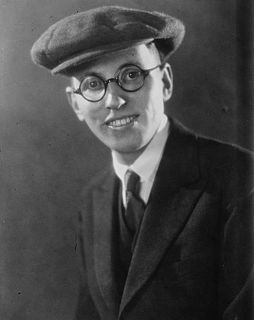A Quote by Noam Chomsky
The intellectual is an individual with a specific public role in society that cannot be reduced simply to . . a faceless professional.
Quote Topics
Related Quotes
But the individual was not a tool for something. He was the maker of tools. He was the one who must build. Even for the best purpose it is criminal to turn an individual into simply a means for some ultimate end. A society in which the dignity of the individual is destroyed cannot hope to be a decent society.
The artist must operate on the assumption that the public consists in the highest order of individual; that he is civilized, cultured, and highly sensitive both to emotional and intellectual contexts. And while the whole public most certainly does not consist in that sort of individual, still the tendency of art is to create such a public - to lift the level of perceptivity, to increase and enrich the average individual's store of values... I believe that it is in a certain devotion to concepts of truth that we discover values.
Because all the societies, all the nations, all the cultures, have taken it for granted that the individuals exist for them, not vice-versa. To me, just the opposite is the case: the society exists for the individual, the culture exists for the individual, the nation exists for the individual. Everything can be sacrificed, but the individual cannot be sacrificed for anything. Individuality is the very flowering of existence - nothing is higher than it. But no culture, no society, no civilization is ready to accept a simple truth.
Silicon Valley tends to believe in the individual who creates a small group and does something big. Democracy is always frustrating, but it creates a society that, for example, allows us to invest in each other's kids, to have public education, to have both a greater society and individual freedom for creating businesses.
The vision of the anointed is one in which ills as poverty, irresponsible sex, and crime derive primarily from 'society,' rather than from individual choices and behavior. To believe in personal responsibility would be to destroy the whole special role of the anointed, whose vision casts them in the role of rescuers of people treated unfairly by 'society'.
The only legitimate interpretation of the concept of the "public" is that it's a highly heterogeneous group of people, and I cannot imagine who has the right to speak on their behalf using a "public" voice. If the multiplicity of the environment is its true nature, then my works defend this truthfulness. The greatest fairness in society is to defend the difference between each individual - the fairness and truthfulness of their inconsistency and differentiation.






































